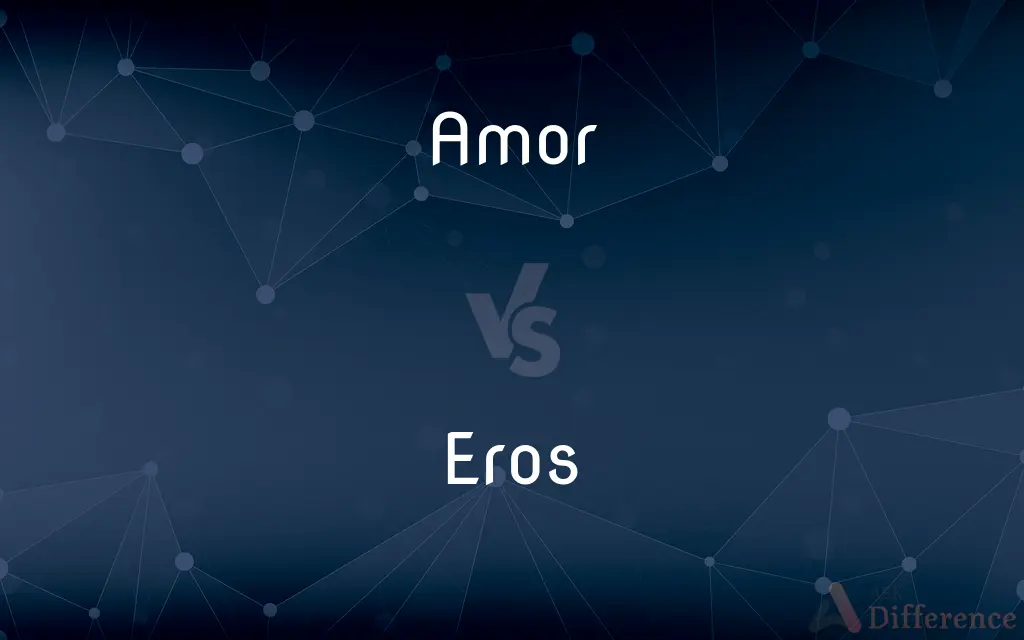Amor vs. Eros — What's the Difference?
By Urooj Arif & Fiza Rafique — Updated on March 31, 2024
Amor refers to a deep, affectionate love, often seen as unconditional or familial, while Eros is associated with passionate, love rooted in physical attraction.

Difference Between Amor and Eros
Table of Contents
ADVERTISEMENT
Key Differences
Amor embodies a broad spectrum of love, encompassing affection, care, and deep, unconditional love often found within families or close friendships. It's characterized by a lasting bond, emotional depth, and a sense of commitment and care beyond physical attraction. Whereas, Eros is driven by desire and physical attraction, representing the intense and passionate aspect of love that seeks pleasure and intimacy. Eros is often the initial spark in romantic relationships but can evolve or incorporate elements of Amor over time.
In the context of relationships, Amor focuses on the emotional connection and a deep sense of belonging and acceptance, highlighting the non-physical aspects of love. On the other hand, Eros centers on physical and attraction, playing a crucial role in the chemistry and initial attraction between individuals. While Eros can be fleeting, Amor aims for a lasting and enduring connection.
Amor is often unconditional, not based on the attributes or actions of the other person but rather on a profound sense of connection and affection. Conversely, Eros may be conditional, ignited by physical appearance, sensuality, or specific traits that stir desire. This distinction underscores the transient nature of Eros compared to the enduring quality of Amor.
Culturally and historically, Amor has been celebrated for its ability to foster deep, meaningful connections that contribute to personal growth and happiness. Eros, while also valued for its role in human connection and procreation, is sometimes viewed through a more cautionary lens due to its potential to lead to obsession or lust without emotional depth.
Despite their differences, Amor and Eros are not mutually exclusive; a healthy, romantic relationship often involves a blend of both, with Eros leading to Amor or Amor deepening through elements of Eros. The balance between the two reflects the complexity and multifaceted nature of human love.
ADVERTISEMENT
Comparison Chart
Definition
Deep, affectionate love, often unconditional.
Passionate, love based on physical attraction.
Focus
Emotional connection, commitment, and care.
Physical attraction, desire.
Duration
Long-lasting, aims for an enduring connection.
Can be fleeting, often the initial spark in relationships.
Conditionality
Unconditional, based on deep emotional bonds.
Conditional, based on physical attributes or traits.
Role in Relationships
Fosters emotional depth, belonging, and growth.
Drives physical intimacy and initial romantic attraction.
Cultural Perception
Celebrated for fostering meaningful connections.
Viewed with caution due to potential for obsession or lust.
Compare with Definitions
Amor
Unconditional love and affection.
A mother's amor for her child is boundless.
Eros
Love driven by physical attraction.
Eros sparked their immediate connection at first sight.
Amor
Commitment and care in relationships.
Amor was the foundation of their 50-year marriage.
Eros
Basis for intimacy and attraction.
Eros played a key role in their passionate romance.
Amor
Deep emotional bond beyond physical attraction.
Their friendship was rooted in amor, lasting through decades.
Eros
The initial spark in romantic relationships.
The Eros between them was undeniable, drawing them together.
Amor
Affectionate love in families or close friendships.
The amor between siblings grew stronger with every challenge.
Eros
Passionate love marked by desire.
Their relationship began with an intense feeling of Eros.
Amor
Enduring, unconditional connection.
Despite the distance, their amor remained unshaken.
Eros
Often transient, seeking pleasure.
Their Eros burned brightly but briefly, leaving memories of passion.
Amor
Alternative form of amour
Eros
Greek Mythology The god of love, son of Aphrodite.
Amor
(Roman mythology) god of love; counterpart of Greek Eros
Eros
The sum of all instincts for self-preservation.
Eros
A winged figure of a child representing love and/or its power.
Eros
A type of love that seeks fulfillment without violation or something else.
Eros
(psychiatry) libido
Eros
(psychiatry) collective instincts for self-preservation; life drive.
Eros
Love; the god of love; - by earlier writers represented as one of the first and creative gods, by later writers as the son of Aphrodite, equivalent to the Latin god Cupid.
Eros
(Greek mythology) god of love; son of Aphrodite; identified with Roman Cupid
Common Curiosities
What is the main difference between Amor and Eros?
Amor represents deep, unconditional love, often emotional and non-physical, while Eros is passionate, love based on physical attraction.
Is Amor considered stronger than Eros?
While not necessarily stronger, Amor is often viewed as more enduring and unconditional, focusing on emotional bonds rather than physical attraction alone.
Can a relationship have both Amor and Eros?
Yes, a healthy romantic relationship often incorporates both, with Eros potentially leading to Amor or Amor deepening through elements of Eros.
Why is Amor important in relationships?
Amor is important because it fosters emotional depth, commitment, and a sense of belonging, contributing to the relationship's longevity and satisfaction.
How does Eros affect relationships?
Eros can initiate romantic relationships through physical attraction and desire, but for a relationship to last, it often needs to develop aspects of Amor.
Is Eros only about physical attraction?
Primarily, yes, Eros focuses on the physical and sensual aspects of love, but it can also encompass the excitement and energy of new romantic connections.
How can couples ensure Eros doesn't overshadow Amor?
Couples can ensure Eros doesn't overshadow Amor by nurturing their emotional connection, communication, and shared experiences, deepening their bond beyond physical attraction.
Can Eros turn into Amor?
Yes, Eros can evolve into Amor as partners form deeper emotional connections, moving beyond physical attraction to establish a lasting bond.
Can you feel Amor for friends?
Yes, Amor can describe the deep, affectionate love and bond between close friends, not limited to romantic or familial relationships.
Why might Eros be considered fleeting?
Eros is considered fleeting because it's based on physical attraction and desire, which can change or diminish over time without the foundation of a deeper emotional connection.
How do cultural perceptions of Amor and Eros differ?
Culturally, Amor is often revered for its ability to create deep, meaningful connections, while Eros may be viewed with both admiration for its role in attraction and caution for its potential to lead to obsession or lust without emotional depth.
How do Amor and Eros contribute to personal growth?
Amor contributes to personal growth by fostering deep, meaningful connections that enrich emotional understanding and empathy. Eros, through its intensity and passion, can open individuals to new experiences and connections, potentially leading to Amor.
How do you recognize Amor in a relationship?
Amor is recognized by a deep sense of care, commitment, and unconditional love, where the well-being and happiness of the other are as important as one's own.
What roles do Amor and Eros play in long-term relationships?
In long-term relationships, Amor plays a crucial role in maintaining emotional connection and commitment, while Eros keeps the physical and passionate aspects of the relationship alive, ensuring a balanced and fulfilling partnership.
Is it possible to have a fulfilling relationship with just Amor or Eros?
While both elements contribute to the richness of relationships, a fulfilling relationship often balances both, with Amor providing emotional depth and Eros adding passion and physical connection.
Share Your Discovery

Previous Comparison
Probabilistic vs. Stochastic
Next Comparison
Comb vs. PickAuthor Spotlight
Written by
Urooj ArifUrooj is a skilled content writer at Ask Difference, known for her exceptional ability to simplify complex topics into engaging and informative content. With a passion for research and a flair for clear, concise writing, she consistently delivers articles that resonate with our diverse audience.
Co-written by
Fiza RafiqueFiza Rafique is a skilled content writer at AskDifference.com, where she meticulously refines and enhances written pieces. Drawing from her vast editorial expertise, Fiza ensures clarity, accuracy, and precision in every article. Passionate about language, she continually seeks to elevate the quality of content for readers worldwide.
















































